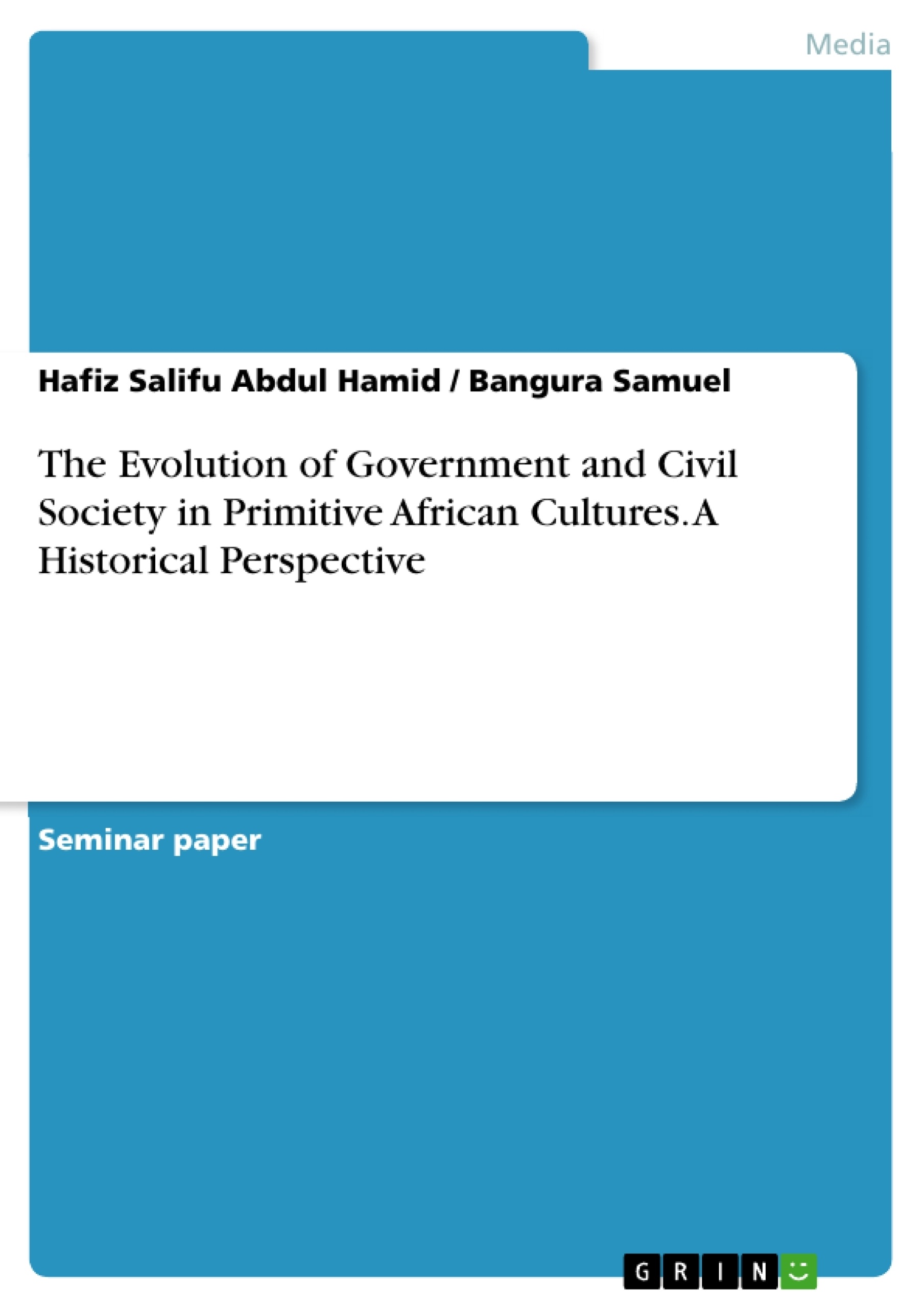The paper titled "The Evolution of Government and Civil Society in Primitive African Cultures: A Historical Perspective" by Abdul Hamid Salifu and Bangura delves into the intricate development of governance structures and civil society in Africa prior to and during colonial influence. The authors argue that Africa's indigenous societies possessed complex and diverse systems of governance and communal organization, which were profoundly disrupted by colonial rule. This disruption led to the imposition of foreign administrative frameworks, fundamentally altering traditional systems of authority and community support. Despite these changes, many traditional governance and social structures persisted and continue to influence modern African political and social dynamics. The paper highlights the resilience and adaptability of African societies in the face of colonial disruption and modern challenges, emphasizing the enduring legacy of pre-colonial traditions. Through historical and anthropological analysis, the study provides insights into the multifaceted impacts of these evolutionary processes on contemporary African society, underscoring the importance of understanding Africa's rich historical context for its future development and democratization.
Inhaltsverzeichnis (Table of Contents)
- Introduction
- Social Organization and Governance
- Colonial Disruption and Adaptation
- Impact on Civil Society
- Cultural Continuities and Adaptations
- Challenges and Opportunities
Zielsetzung und Themenschwerpunkte (Objectives and Key Themes)
This essay explores the impact of the development of government and civil society on the primitive culture of African people. It draws upon existing literature to illuminate the multifaceted dynamics at play, tracing the evolution of governance structures and social organizations in Africa before, during, and after the colonial era. The essay focuses on how traditional African societies adapted to the introduction of colonial systems and the subsequent emergence of modern government institutions. It highlights both the disruptions caused by colonialism and the resilience of indigenous practices in shaping contemporary African politics and society.
- The diverse governance systems present in pre-colonial African societies
- The impact of colonial rule on indigenous governance structures and the emergence of civil society
- The influence of traditional African practices on modern governance structures and civic organizations
- The challenges and opportunities facing African societies as they navigate development and democracy
- The complex interplay of historical legacies, colonial interventions, and contemporary dynamics in shaping African societies
Zusammenfassung der Kapitel (Chapter Summaries)
- Introduction: This chapter introduces the concept of civil society and its evolution, focusing on the African context and the contrast between traditional African governance and European theories of state formation. It also provides a background on the diversity of African societies.
- Social Organization and Governance: This section explores the complex array of governance systems present in pre-colonial African societies. It highlights the role of councils of elders and chiefs in facilitating decision-making, conflict resolution, and social cohesion within communities.
- Colonial Disruption and Adaptation: This chapter examines the significant disruption caused by European colonialism on indigenous governance structures in Africa. It illustrates the clash between traditional African societies and colonial rule, highlighting the societal changes and conflicts that arose as a result of imposed foreign administrative frameworks.
- Impact on Civil Society: This section explores how the introduction of formalized government institutions under colonial rule influenced the development of civil society in Africa. It discusses the changes in social organization and welfare provisions brought about by colonial governments, which reshaped the social fabric of African societies and gave rise to new patterns of civic engagement and collective action.
- Cultural Continuities and Adaptations: This chapter highlights the resilience of indigenous political systems and their ongoing influence on contemporary African politics and society despite the disruptions caused by colonialism. It emphasizes the enduring legacy of Africa's pre-colonial heritage, demonstrating how indigenous norms and practices continue to inform modern governance structures and civic organizations.
- Challenges and Opportunities: This section explores the challenges and opportunities presented by the emergence of modern government and civil society in Africa. It discusses issues such as corruption, ethnic tensions, and authoritarianism while also acknowledging the capacity of African societies to adapt and innovate in response to these challenges, drawing upon both traditional and modern forms of governance and civic engagement.
Schlüsselwörter (Keywords)
This essay examines the intersection of traditional African governance, colonialism, and the development of civil society in Africa. Key themes include the evolution of governance structures, the impact of colonial rule on indigenous practices, the resilience of traditional African norms, and the challenges and opportunities facing modern African societies. Other key concepts include tribal states, civil society organizations, cultural diversity, and the interplay of historical legacies and contemporary dynamics.
- Quote paper
- Hafiz Salifu Abdul Hamid (Author), Bangura Samuel (Author), 2024, The Evolution of Government and Civil Society in Primitive African Cultures. A Historical Perspective, Munich, GRIN Verlag, https://www.hausarbeiten.de/document/1478467


